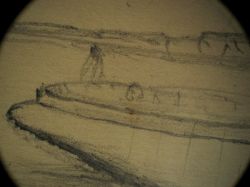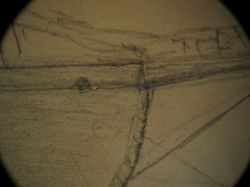loading 
Fitz Henry Lane
HISTORICAL ARCHIVE • CATALOGUE RAISONNÉ • EDUCATIONAL RESOURCE
An online project under the direction of the CAPE ANN MUSEUM
An online project under the direction of the CAPE ANN MUSEUM
Catalog entry
inv. 189
Sloop
Boat
Early 1850s Graphite on paper 9 1/2 x 11 3/4 in. (24.1 x 29.8 cm) Signed lower center (in pencil): Lane del.
|
Supplementary Images
Provenance (Information known to date; research ongoing.)
the Artist, Gloucester, Mass.
Joseph L. Stevens, Jr., Gloucester, Mass.
Samuel H. Mansfield, Gloucester, Mass.
Cape Ann Museum, Gloucester, Mass., 1927
Marks & Labels
Marks: Inscribed upper left (in red ink): 53 [numbering system used by curator A. M. Brooks upon Samuel H. Mansfield's donation of the drawings to the Cape Ann Museum]
Exhibition History
No known exhibitions.Published References
Wilmerding, John. Paintings by Fitz Hugh Lane. Washington, DC: National Gallery of Art; in association with Harry N. Abrams, 1988., ill. in b/w p. 92 fig. 25, Sloop.


Commentary
While unidentified in this drawing, the sloop depicted may be “Widgeon”, based on her reduced rig (no topmast), her second place at the finish line of the 1856 New York Yacht Club Regatta as depicted in New York Yacht Club Regatta (1), 1856 (inv. 66), and her hull form which strongly resembles that of the New York pilot schooner “Mary Taylor”. Both of these vessels were modeled and built by George Steers, who was a leading designer of yachts and pilot vessels in this period. (Ref. 1)
“Widgeon” was owned by Daniel Edgar, who was then Commodore of the New York Yacht Club. Prior to the regatta, “Widgeon” had sprung her lower mast, forcing Edgar to sail her with no topmast, no topsail and outer jibs, a reefed mainsail, and a jib without its bonnet (the lower part which is laced to the jib). That she was still able to race, placing second boat-for boat and third on corrected time, speaks of outstanding vessel design and handling. (Ref. 2)
Lane’s drawing captures this vessel's hull form through subtle shading at the bow and under the stern, very much as we see in Steers’ model of “Mary Taylor” and subsequent pilot schooners. No less than with large vessels, Lane’s understanding of hull form allowed him to depict small craft with accuracy and detail that would command the respect and admiration of master shipwrights and naval architects alike.
–Erik Ronnberg
References:
1. William P. Stephens, “Traditions and Memories of American Yachting” (Camden, Maine: International Marine Publishing Company. 1981), p. 44.
2. Robert Bennet Forbes, “Regatta at New Bedford, Massachusetts, 8 August 1856 (in “Documents”, “The American Neptune”, Vol. X, 1950), pp. 231-234.
“The U. S. Nautical Magazine, and Naval Journal” (New York: Oliver W. Griffiths, 1856), Vol. V, October, 1856 to March, 1857, pp. 15-17.